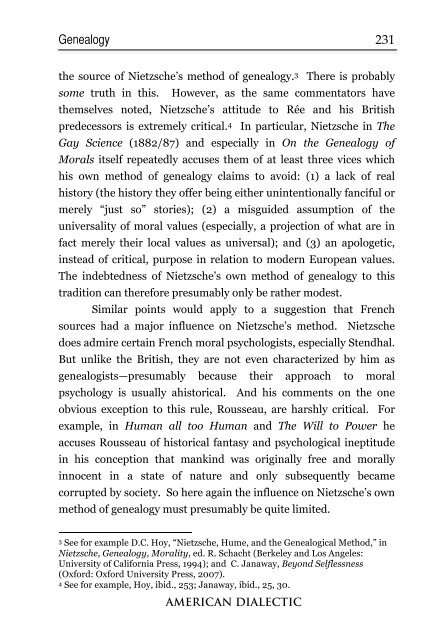Genealogy Michael Forster - American Dialectic
Genealogy Michael Forster - American Dialectic
Genealogy Michael Forster - American Dialectic
Create successful ePaper yourself
Turn your PDF publications into a flip-book with our unique Google optimized e-Paper software.
<strong>Genealogy</strong><br />
AMERICAN DIALECTIC<br />
231<br />
the source of Nietzsche’s method of genealogy. 3 There is probably<br />
some truth in this. However, as the same commentators have<br />
themselves noted, Nietzsche’s attitude to Rée and his British<br />
predecessors is extremely critical. 4 In particular, Nietzsche in The<br />
Gay Science (1882/87) and especially in On the <strong>Genealogy</strong> of<br />
Morals itself repeatedly accuses them of at least three vices which<br />
his own method of genealogy claims to avoid: (1) a lack of real<br />
history (the history they offer being either unintentionally fanciful or<br />
merely “just so” stories); (2) a misguided assumption of the<br />
universality of moral values (especially, a projection of what are in<br />
fact merely their local values as universal); and (3) an apologetic,<br />
instead of critical, purpose in relation to modern European values.<br />
The indebtedness of Nietzsche’s own method of genealogy to this<br />
tradition can therefore presumably only be rather modest.<br />
Similar points would apply to a suggestion that French<br />
sources had a major influence on Nietzsche’s method. Nietzsche<br />
does admire certain French moral psychologists, especially Stendhal.<br />
But unlike the British, they are not even characterized by him as<br />
genealogists—presumably because their approach to moral<br />
psychology is usually ahistorical. And his comments on the one<br />
obvious exception to this rule, Rousseau, are harshly critical. For<br />
example, in Human all too Human and The Will to Power he<br />
accuses Rousseau of historical fantasy and psychological ineptitude<br />
in his conception that mankind was originally free and morally<br />
innocent in a state of nature and only subsequently became<br />
corrupted by society. So here again the influence on Nietzsche’s own<br />
method of genealogy must presumably be quite limited.<br />
3 See for example D.C. Hoy, “Nietzsche, Hume, and the Genealogical Method,” in<br />
Nietzsche, <strong>Genealogy</strong>, Morality, ed. R. Schacht (Berkeley and Los Angeles:<br />
University of California Press, 1994); and C. Janaway, Beyond Selflessness<br />
(Oxford: Oxford University Press, 2007).<br />
4 See for example, Hoy, ibid., 253; Janaway, ibid., 25, 30.


